 Late on Wednesday afternoon, the U.S. Supreme Court reversed [PDF] the 4th Circuit Court of Appeals ruling that had blocked two elements of North Carolina's massive new voter suppression law. Justice Ruth Bader Ginsburg dissented in an opinion joined by Justice Sonia Sotomayor.
Late on Wednesday afternoon, the U.S. Supreme Court reversed [PDF] the 4th Circuit Court of Appeals ruling that had blocked two elements of North Carolina's massive new voter suppression law. Justice Ruth Bader Ginsburg dissented in an opinion joined by Justice Sonia Sotomayor.
"The order isn't a permanent reversal," notes election law expert Justin Levitt, "it's a stay awaiting the disposition of a petition for certiorari, if one is filed. But it's enough to put the state's law back in effect this November."
"The nation's worst voter suppression law since the Jim Crow era," as we described the law when state Republicans enacted it within hours after SCOTUS had gutted a key portion of the Voting Rights Act, will now be in full effect for this year's November general election, despite having been shown to have disenfranchised hundreds of voters during the state's primary earlier this year. There was no debate or time allowed for public comment before the law --- which shortens early voting hours, ends same-day registration, implements disenfranchising polling place Photo ID restrictions (in 2016) and much more --- was passed by the GOP-majority in the NC legislature last year.
Barring a further hearing by the Court, their response to NC's emergency appeal reverses the 4th Circuit Court of Appeals' ruling that had restored both same-day registration and the counting of provisional ballots cast in the wrong precinct. All of the law's other provisions had already been approved for use this year by a George W. Bush-appointed U.S. District Court judge last month, pending a full trial on the merits of the law scheduled for next summer....
'Record-based reasoned judgment'
"At the end of the day," the 4th Circuit wrote when overturning the U.S. District Court judge's decision, "we cannot escape the district court's repeated findings that plaintiffs presented undisputed evidence showing that same-day registration and out-of-precinct voting were enacted to increase voter participation, that African-American voters disproportionately used those electoral mechanisms and that House Bill 589 restricted those mechanisms and thus disproportionately impacts African-American voters."
In her Supreme Court dissent late today, Justice Ginsberg cited that decision, writing: "The Court of Appeals determined that at least two of the measures --- elimination of same-day registration and termination of out-of-precinct voting --- risked significantly reducing opportunities for black voters to exercise the franchise in violation of Section 2 of the Voting Rights Act. I would not displace that record-based reasoned judgment."
In their response [PDF] to NC's emergency appeal to the Supreme Court, the League of Women Voters, one of the plaintiffs in the ongoing lawsuit, had cited the Republican move to enact the law on "the very day this Court issued its" decision in the Voting Rights Act case last Summer, and how the law had radically altered "a wide range of areas, including registration, ballot counting procedures, and early voting, as well as rules on poll observers, and voter identification requirements."
"In so doing," the League wrote, "the State surgically eliminated the precise forms of registration and voting that had enabled significant expansion of African-Americans civic participation in North Carolina over the previous decade."
The League and its co-plaintiffs are not the only ones who disputed the state Republicans' claim that a limited injunction to prevent the state from eliminating two procedures that have been in place for years --- same day registration and the counting of out-of-precinct ballots --- entailed a "massive and unprecedented last-minute change" to voting laws, which SCOTUS has, at least until this year, long cautioned against. Following the 4th Circuit decision, "North Carolina county election directors have en masse reported that they can implement these two practices without harm to the voters," the League had written in their Response.
But that argument appears to have fallen on mostly deaf ears at the High Court, despite evidence that hundreds of voters in the Tar Heel State were disenfranchised by the new voting restrictions during the state's primary election earlier this year.
Hundreds disenfranchised already by NC law
Where, during the November 2010 election, "over 21,000 voters were able to vote because of the availability of" same day registration, the League explained, its absence led to disenfranchisement of many voters during the state's May primary.
An especially shameful case involved the disenfranchisement of Craig Thomas, an active member of the U.S. armed forces who returned home "from an 18-month deployment in Afghanistan and sought to vote, only to be told at his early voting site that there was 'no record of [his] registration'...He had not been notified that his registration was cancelled while he was deployed" --- a deficiency that he was unable to remedy due to the absence of same-day registration this year.
Thomas was just "one of 454 North Carolina voters who would have had their ballots counted in 2012 but did not have them counted in the 2014 primary because of North Carolina's elimination of same-day registration and prohibition on counting a provisional ballot cast in the wrong precinct," according to a report by Democracy NC that was cited by The Nation's Ari Berman last month.
In addition to Thomas' lost vote, that report also cited hundreds of others who where "denied a chance to have their votes heard" during the primary election with the new voting restrictions in place. Among those who also lost their right to vote, as cited by Democracy NC:
With the Court's elimination of same-day registration in the November election, and clearance to toss all provisional ballots cast at a precincts where a voter was not assigned to vote, the odds may have just increased for a Republican take-over of the U.S. Senate, as incumbent Democratic Sen. Kay Hagan is currently in a very tough race for re-election in NC.
A new report just released by the non-partisan U.S. Government Accountability Office found that voting restrictions akin to those now allowed in NC, have served to depress voter turnout among young voters, African-Americans and others inclined to vote in favor of Democrats in states where such measures have been implemented.
Last week, in a decision with a similar result, the Supreme Court voted 5 to 4 to overturn the 6th Circuit Court of Appeal in Ohio. That court had affirmed a lower court's order to restore early voting hours and days which state Republicans had tried to scuttle. Even though both the U.S. District Court judge and Appellate jurists agreed that the law violated voting rights in the state, the SCOTUS decision cut them off at the knees by allowing state Republicans to rollback successful voting reforms implemented after the Buckeye State's disastrous 2004 election.
There will be still more decisions forthcoming from this Court that are likely to have a direct impact on the results of the November 4th election. One of the most anticipated is a decision that may allow Photo ID voting restrictions in Wisconsin, where Republican Gov. Scott Walker also faces a "toss up" re-election contest, despite a U.S. District Court judge's injunction, after a full trial, finding that the law could serve to disenfranchise as many as 300,000 legally registered Badger State voters. That injunction was overturned by a deadlocked, 5 to 5 ruling by the 7th Circuit late last month, and bolstered by a rightwing judge who offered a written ruling this week offering all manner of demonstrably blatant falsehoods for consideration by the Supremes. A ruling in that case is expected any day now.
A similarly restrictive Photo ID voting law is currently being challenged in the state of Texas and may also make its way to the Supreme Court prior to this year's general election.
- Ernest A. Canning also contributed to this report
(Snail mail support to "Brad Friedman, 7095 Hollywood Blvd., #594 Los Angeles, CA 90028" always welcome too!)
|


 'Green News Report' 9/18/25
'Green News Report' 9/18/25
 MAGA Exploiting Kirk's Death as Their 9/11: 'BradCast' 9/17/25
MAGA Exploiting Kirk's Death as Their 9/11: 'BradCast' 9/17/25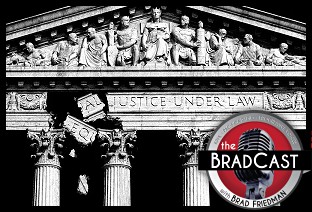 Our Crumbling Courts and Withering Rule of Law: 'BradCast' 9/16/25
Our Crumbling Courts and Withering Rule of Law: 'BradCast' 9/16/25 'Green News Report' 9/16/25
'Green News Report' 9/16/25 After Kirk Murder, First Amendment, But Not Second, Under Attack. Prove Me Wrong: 'BradCast' 9/15/25
After Kirk Murder, First Amendment, But Not Second, Under Attack. Prove Me Wrong: 'BradCast' 9/15/25 Sunday 'False Narrative' Toons
Sunday 'False Narrative' Toons SCOTUS Suspension of 4th Amendment Rights Poses Ominous Threat to Constitutional Republic
SCOTUS Suspension of 4th Amendment Rights Poses Ominous Threat to Constitutional Republic 'Dark Moment for America': 'BradCast' 9/11/25
'Dark Moment for America': 'BradCast' 9/11/25 Kirk Assassinated in UT; Shutdown Battle Takes Shape in D.C.: 'BradCast' 9/10/25
Kirk Assassinated in UT; Shutdown Battle Takes Shape in D.C.: 'BradCast' 9/10/25 Despite Voting Co. Lawsuit, Fox Ready to Shout Fake 'Fraud' Again: 'BradCast' 9/9
Despite Voting Co. Lawsuit, Fox Ready to Shout Fake 'Fraud' Again: 'BradCast' 9/9  'Green News Report' 9/9/25
'Green News Report' 9/9/25 Trump Readies Wars on Venezuela and Chicago: 'BradCast' 9/8/25
Trump Readies Wars on Venezuela and Chicago: 'BradCast' 9/8/25 Sunday 'Big Ball Room' Toons
Sunday 'Big Ball Room' Toons 'Green News Report' 9/4/25
'Green News Report' 9/4/25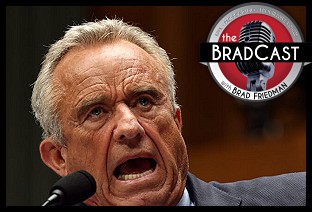 RFK Jr.'s War on the Science of Public Health: 'BradCast' 9/4/25
RFK Jr.'s War on the Science of Public Health: 'BradCast' 9/4/25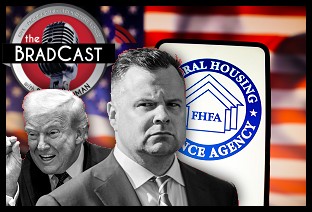 Trump's 'Cook'ed-Up Mortgage Fraud Claims: 'BradCast' 9/3/25
Trump's 'Cook'ed-Up Mortgage Fraud Claims: 'BradCast' 9/3/25 While We Were Out: 'BradCast' 9/2/25
While We Were Out: 'BradCast' 9/2/25 Hypocrisy Behind RW Opposition To CA 'Election Rigging Response Act'
Hypocrisy Behind RW Opposition To CA 'Election Rigging Response Act'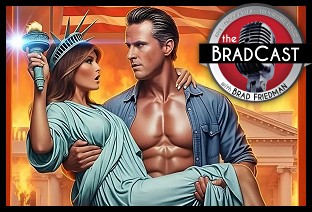 CA's 'Deterrence' Map; Trump's 'Fascist Theatre': 'BradCast' 8/21/25
CA's 'Deterrence' Map; Trump's 'Fascist Theatre': 'BradCast' 8/21/25 Trump's 'Stalinesque' Plot to Whitewash History: 'BradCast' 8/20/25
Trump's 'Stalinesque' Plot to Whitewash History: 'BradCast' 8/20/25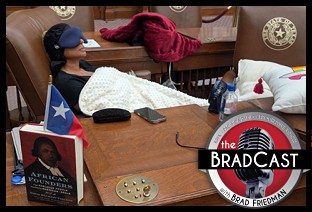 TX GOP Imprisons Dem State Lawmaker in State House: 'BradCast' 8/19/25
TX GOP Imprisons Dem State Lawmaker in State House: 'BradCast' 8/19/25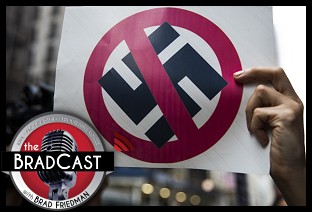 Trump, Nazis and Trump's Nazified Elections: 'BradCast' 8/18/25
Trump, Nazis and Trump's Nazified Elections: 'BradCast' 8/18/25
 VA GOP VOTER REG FRAUDSTER OFF HOOK
VA GOP VOTER REG FRAUDSTER OFF HOOK Criminal GOP Voter Registration Fraud Probe Expanding in VA
Criminal GOP Voter Registration Fraud Probe Expanding in VA DOJ PROBE SOUGHT AFTER VA ARREST
DOJ PROBE SOUGHT AFTER VA ARREST Arrest in VA: GOP Voter Reg Scandal Widens
Arrest in VA: GOP Voter Reg Scandal Widens ALL TOGETHER: ROVE, SPROUL, KOCHS, RNC
ALL TOGETHER: ROVE, SPROUL, KOCHS, RNC LATimes: RNC's 'Fired' Sproul Working for Repubs in 'as Many as 30 States'
LATimes: RNC's 'Fired' Sproul Working for Repubs in 'as Many as 30 States' 'Fired' Sproul Group 'Cloned', Still Working for Republicans in At Least 10 States
'Fired' Sproul Group 'Cloned', Still Working for Republicans in At Least 10 States FINALLY: FOX ON GOP REG FRAUD SCANDAL
FINALLY: FOX ON GOP REG FRAUD SCANDAL COLORADO FOLLOWS FLORIDA WITH GOP CRIMINAL INVESTIGATION
COLORADO FOLLOWS FLORIDA WITH GOP CRIMINAL INVESTIGATION CRIMINAL PROBE LAUNCHED INTO GOP VOTER REGISTRATION FRAUD SCANDAL IN FL
CRIMINAL PROBE LAUNCHED INTO GOP VOTER REGISTRATION FRAUD SCANDAL IN FL Brad Breaks PA Photo ID & GOP Registration Fraud Scandal News on Hartmann TV
Brad Breaks PA Photo ID & GOP Registration Fraud Scandal News on Hartmann TV  CAUGHT ON TAPE: COORDINATED NATIONWIDE GOP VOTER REG SCAM
CAUGHT ON TAPE: COORDINATED NATIONWIDE GOP VOTER REG SCAM CRIMINAL ELECTION FRAUD COMPLAINT FILED AGAINST GOP 'FRAUD' FIRM
CRIMINAL ELECTION FRAUD COMPLAINT FILED AGAINST GOP 'FRAUD' FIRM RICK SCOTT GETS ROLLED IN GOP REGISTRATION FRAUD SCANDAL
RICK SCOTT GETS ROLLED IN GOP REGISTRATION FRAUD SCANDAL VIDEO: Brad Breaks GOP Reg Fraud Scandal on Hartmann TV
VIDEO: Brad Breaks GOP Reg Fraud Scandal on Hartmann TV RNC FIRES NATIONAL VOTER REGISTRATION FIRM FOR FRAUD
RNC FIRES NATIONAL VOTER REGISTRATION FIRM FOR FRAUD EXCLUSIVE: Intvw w/ FL Official Who First Discovered GOP Reg Fraud
EXCLUSIVE: Intvw w/ FL Official Who First Discovered GOP Reg Fraud GOP REGISTRATION FRAUD FOUND IN FL
GOP REGISTRATION FRAUD FOUND IN FL

































